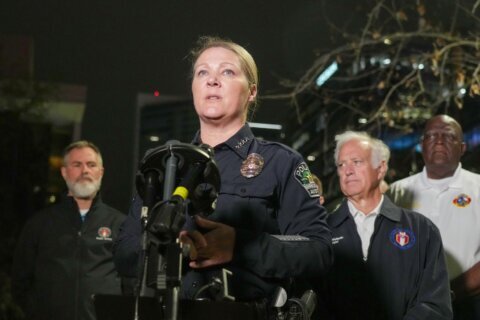WASHINGTON — The former NAACP leader who resigned Monday amid disclosures from her parents that she’s white spoke publicly for the first time Tuesday morning.
Rachel Dolezal told NBC’s Matt Lauer a complex story of self-identification, sometimes resisted answering his questions directly and said that, other than handling a few interviews differently, she’d make the same decisions.
The controversy over Dolezal’s identity took flight last week after she was asked whether she is African-American and replied, “I don’t understand the question.”
Asked point-blank on Tuesday by Lauer whether she is an African-American woman, Dolezal said, “I identify as black.”
Shown a picture of herself as a teenager and asked whether the girl in the picture is an African-American woman, Dolezal replied, “visibly she would be identified as white.” Asked again whether she were identifying as African-American in the picture, she answered, “in that picture, during that time, no.” Yet Dolezal said her “self-identification with the black experience” started at about age five, when she began “drawing self-portraits “with the brown crayon instead of the peach crayon, and black curly hair.”
The lines between Dolezal’s racial self-identification, her public persona and the biology of her parents began to blur in earnest when she was doing human-rights work in Idaho, she said. She began to be identified in news reports as “transracial,” then “bi-racial,” and after she and her sons were victimized by burglaries and found nooses around their house, she was identified as a black woman, and didn’t correct the characterization.
“Well, why didn’t you correct it?,” Lauer said. “You knew it wasn’t true.”
“Because it’s more complex than being true or false in that particular instance,” she said.
Lauer reminded Dolezal that her parents recently said “she’s clearly our daughter, and we’re clearly Caucasian.”
“When did you start deceiving people?” Lauer asked
“It’s a little more complex than me identifying as black or answering a question of ‘are you black or white?’” she said.
Asked whether she’s darkened her skin, Dolezal replied, “I certainly don’t stay out of the sun,” but that “I certainly don’t put on blackface as a performance.”
And when she got full custody of her son Isaiah, she said, the transformation was complete.
“I certainly can’t be seen as white and be Isaiah’s mom.”
Lauer said that Dolezal had previously indicated an older black friend as her father, to which Dolezal replied, “Albert Wilkerson is my dad. Every man can be a father; not every man can be a dad.”
In 2002, Dolezal sued Howard University, claiming that the historically black college where she earned a master’s in art had discriminated against her because she was white. Dolezal said that she sued because her scholarship and teaching-assistant position had been taken away, and she had been told “you probably have white relatives who can afford to help you with your tuition.”
The university hasn’t commented on the lawsuit; it was dismissed.
She was reportedly an effective leader of the Spokane NAACP, and Lauer asked whether she could have been as successful if she was known as white. “I don’t know,” she said.
Dolezal said that, given the given the discussion over race and identity that has followed from the controversy, she would make the same decisions. She believes that the situation has opened up a discussion on “What it is to be human. And I hope that that can drive at the core of definitions of race, ethnicity, culture, self-definition, personal agency, and ultimately empowerment.”
“There are probably a couple of interviews I would do a little differently,” she said, but “overall, my life has been one of survival. And the decisions that I have made along the way, including my identification, have been to survive, and carry forward on my journey and life continuum.”
She concluded by saying that on Monday “one of my sons” said, “Racially, you’re human, and culturally you’re black.”








